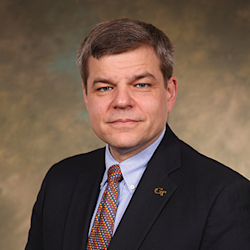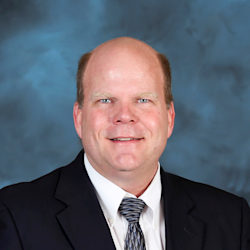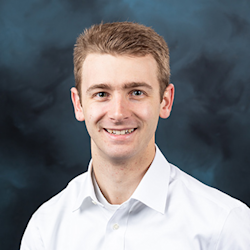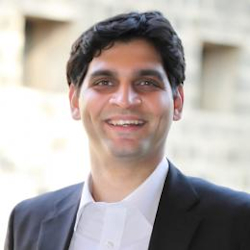Tom and Lonnie Chat: Artificial Intelligence, Pushing Your Machines Through Chatter and Into Productivity
Process parameters in milling are typically selected using tool supplier and handbook recommendations, or previous experience. If unstable behavior (chatter) is observed, the conventional wisdom is to reduce the spindle speed and axial depth of cut. In this podcast, we will discuss stability maps in machining, which separate stable and unstable (or chatter) combinations of cut depth and spindle speed. Using knowledge of the stability maps, spindle speed and axial depth of cut can actually be increased to eliminate chatter. This enables improvement in material removal rates and productivity while eliminating chatter. We will show how to create stability maps, which exist for every tool-holder-machine combination, and how to use them to select optimal stable parameters to maximize productivity and eliminate chatter. We will discuss the application of artificial intelligence/machine learning (AI/ML) for learning stability maps in a production environment. An automated method for learning the stability maps and identifying optimal process parameters in an industrial environment with closed-loop control and machine learning using modern machine tools will be presented. We will discuss how this work is moving from the laboratory and research and development centers into production operations. Join us to see how some of the latest concepts in AI and ML can help you to eliminate chatter and improve productivity at the same time. Thursday, December 16, 2021; 10-10:45am ET
Didn't get a chance to attend? View the recording today!
Meet our Speakers!

Thomas Kurfess is the Chief Manufacturing Officer for Oak Ridge National Laboratory (ORNL). In this position he is responsible for the strategic planning for advanced manufacturing at ORNL. His research focuses on the design and development of advanced systems by rapidly developing, scaling and integrating new technologies into production operations. Kurfess has significant experience in production operations, manufacturing systems and policy issues related to advanced manufacturing. He began his academic career at Carnegie Mellon University where he rose to the rank of Associate Professor. In 1994, he moved to the Georgia Institute of Technology where he rose to the rank of Professor in the George W. Woodruff School of Mechanical Engineering. In 2005, he was named Professor and BMW Chair of Manufacturing in the Department of Mechanical Engineering at Clemson University’s International Center for Automotive Research. In 2012, he returned to Georgia Tech as a Professor of Mechanical Engineering and the HUSCO/Ramirez Distinguished Chair in Fluid Power and Motion Control. During 2012-2013, Kurfess was on leave serving as the Assistant Director for Advanced Manufacturing at the Office of Science and Technology Policy in the Executive Office of the President of the United States of America. In this position, he had responsibility for engaging the federal sector and the greater scientific community to identify possible areas for policy actions related to manufacturing. He is Past President of the Society of Manufacturing Engineers (SME). He is currently serving on the Board of Governors for the American Society of Mechanical Engineers (ASME), the Board of director for SME, the Board of Director for the National Center for Defense Manufacturing and Machining (NCDMM), the National Center for Manufacturing Sciences (NCMS), the Board of Trustees for the MT Connect Institute, and he Executive Committee of MxD (formerly the Digital Design and Manufacturing Innovation Institute). He has received numerous awards including a National Science Foundation (NSF) Young Investigator Award, an NSF Presidential Faculty Fellowship Award, the ASME Pi Tau Sigma Award, SME Young Manufacturing Engineer of the Year Award, the ASME Blackall Machine Tool and Gage Award, the ASME Gustus L. Larson Award, an ASME Swanson Federal Award, and the SME Education Award. Kurfess is a member of the National Academy of Engineering, a Fellow of the AAAS, ASME, and SME. He earned his PhD, SM and SB in mechanical engineering, and an SM in Electrical Engineering and Computer Science from the Massachusetts Institute of Technology.

Lonnie Love, Ph.D., is the group leader of ORNL’s Manufacturing Systems Research Group. He has over 20 years of experience in the design and control of complex robotic and hydraulic systems. His primary expertise is in the areas of design, robotics, hydraulics, additive manufacturing and nanomaterials. He is the project lead for the Big Area Additive Manufacturing program at ORNL that is focusing on large scale, high speed polymer and metal additive manufacturing. The program has partnered with Cincinnati Incorporated for commercialization. Recent research efforts have focused on developing new lightweight low-cost hydraulic systems through additive manufacturing. Example applications include underwater robotics, prosthetics and haptic interfaces. Lonnie was ORNL’s 2009 Inventor of the year, has over 30 invention disclosures and patents and 75 peer reviewed publications. He serves on the scientific advisory board for NSF’s Center for Compact and Efficient Fluid Power and is on the Medical and Scientific Advisory Board for OrthoCare Innovations.

R&D at Oak Ridge National Lab, Manufacturing Demonstration Facility Kyle Saleeby is an R&D Staff member at Oak Ridge National Lab in the Manufacturing Demonstration Facility. His research involves connecting machines and manufacturing processes with Industry 4.0 and IoT technologies. His current focus centers on applications of data analytics for Hybrid Manufacturing processes. Kyle received his B.S. degree in mechanical engineering from MIT (2017) and his M.S. degree in mechanical engineering from Georgia Tech (2019). He is currently pursuing a PhD degree from Georgia Tech, focusing on agent-based open data architectures for manufacturing processes. In his free time, Kyle loves anything to do with the water, whether it be fishing, scuba diving, or a sunset cruise. If you can’t find him in the machine shop, check the Gulf of Mexico.

Dr. Jaydeep Karandikar is a staff researcher in the Intelligent Machine Tool Research group at Oak Ridge National Laboratory. Jaydeep broad research interests include machining process modeling, monitoring, and optimization and smart manufacturing. From 2014 to 2019, he was a lead research engineer at GE Global Research, Niskayuna, NY. Jaydeep completed his PhD from University of North Carolina at Charlotte with Prof. Tony Schmitz in 2013. After graduation, he did his post-doc at Georgia Tech with Prof. Tom Kurfess. Jaydeep is the 2016 recipient of the SME Outstanding Young Manufacturing Engineer award. [Here is his web page.](https://www.ornl.gov/staff-profile/jaydeep-m-karandikar)
